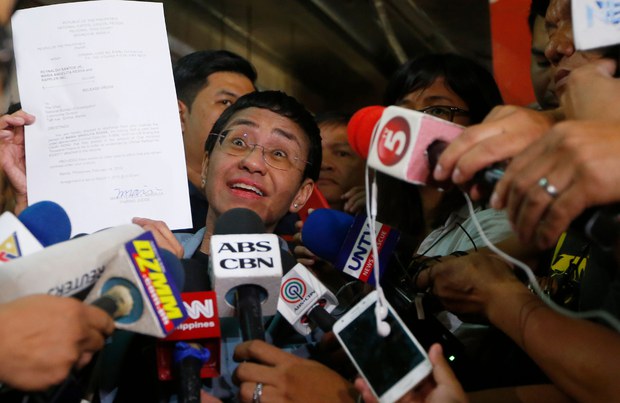Freed on Bail, Rappler’s Ressa Blasts Philippine Government
2019.02.14
Manila and Bacolod, Philippines
 Rappler chief Maria Ressa, who posted bail at a court in in Manila, shows her release order after spending a night in jail on a cyber libel charge, Feb. 14, 2019.
Rappler chief Maria Ressa, who posted bail at a court in in Manila, shows her release order after spending a night in jail on a cyber libel charge, Feb. 14, 2019.
Journalist Maria Ressa posted bail Thursday after spending a night in detention, and then blasted what she called the Philippine government’s “weaponization” of a cyber-libel law.
The National Bureau of Investigation (NBI) arrested Ressa, chief executive officer of the online news site Rappler, on Wednesday but she could not post bail at that time because the authorities took her into custody after office hours.
“My stay last night at the NBI really made me think what this is all about, and for me, it’s about two things: It’s abuse of power and weaponization of the law,” Ressa said.
She is charged with cyber libel, which became an offense under the Cybercrime Prevention Act of 2012.
After emerging from detention with her release order, Ressa said the ordeal was “not just about me, not just about Rappler,” but puts into question the rights of an unfettered press guaranteed by the constitution.
Reza said “someone actually told our reporter last night, ‘Be silent or you’ll be next.’” She was referring to an alleged threat made by officers against a Rappler reporter who shot video of her being taken into custody.
The government’s suppression of press freedom, she added, was a “death by a thousand cuts to our democracy.”
The case against Ressa was brought by businessman Wilfredo Keng in late 2017 over a Rappler story published five years earlier. The article identified Keng as the owner of a sports utility vehicle that then-Supreme Court chief justice had used during his 2012 impeachment trial for corruption.
That year, the Senate found Chief Justice Renato Corona guilty of violating a rule about disclosing real assets and net worth. Corona died of natural causes four years later.
Keng had complained that the report, which cited a background check on him, painted him as having alleged links to illegal drugs and human trafficking. Rappler said it based its article on intelligence reports.
Ressa and her lawyers contend that she could not be charged for cyber libel since the article was published in May 2012, four months before the law came into force. The Department of Justice, on the other hand, insisted that the article was libelous because the article was updated in 2014, when the law was in effect.
Media support
Media organizations have denounced Ressa’s arrest, calling it part of the government’s attempts to shut down Rappler.
The publication provoked the ire of President Rodrigo Duterte – known for his aversion to criticism and dissent – for its critical reporting about his administration, especially its brutal drug war. It has banned the news organization from covering his activities.
Aside from the cyber libel case, the government’s Securities and Exchange Commission ordered Rappler’s license revoked for allegedly violating a constitutional prohibition on foreign ownership of media. The decision is pending with the Court of Appeals.
Ressa and the organization have faced tax evasion charges as well.
Social media giant Facebook had also tapped Rappler, along with Vera Files, another Filipino organization, as media organizations involved in its “third-party fact check program.”
Presidential spokesman Salvador Panelo said the government agreed with Facebook’s resolve in combating fake news, but stressed that it had misgivings about its choice to involve Ressa’s organization.
“We find it ironic, however, that the one chosen by Facebook to verify posts by media outfits or bloggers, whether a story or content is hoax, false or misleading, has a record of spreading fake news,” he said, alluding to Rappler.
“This, not to mention that its chosen partner also has a reputation of being predisposed against a majority, if not all, of the policies of this administration,” Panelo said.
He said Filipinos had become more knowledgeable in analyzing news and stressed that it be left to them to determine which sites were used to spread “negative propaganda and biased and distorted stories.”
Meanwhile, the Foreign Correspondents Association of the Philippines (FOCAP), an organization representing journalists working for some of the world’s leading news agencies, said it stood with Ressa and Rappler.
The attempt to jail Ressa, a respected senior journalist, was the “latest legal stratagem that threatens the freedom of the press all of us have fought for and will always defend,” FOCAP said.
“We in FOCAP will always stand against any move, explicit or otherwise, that is designed to undermine the freedoms that are a lifeline to truly free, relevant and courageous journalism,” the association said.
It said it would continue to hold Duterte or any other leader accountable whenever necessary.
“We will speak truth to power with all independent media across the Philippines,” it said.







